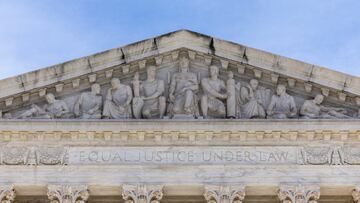How can SCOTUS ruling on social media affect day-to-day life?
SCOTUS will determine the legality of two states’ laws that seek to penalize social media companies that restricted users expressing their viewpoint.

Justices on the Supreme Court heard oral arguments on Monday about the constitutionality of two state laws that would penalize social media companies that restricted users expressing their viewpoint. A ruling in the case is expected by June when the high court will recess for the summer.
The Florida and Texas laws were passed in 2021 after then-President Trump was barred from Facebook, Twitter and YouTube in the wake of the January 6 assault on the US Capitol. NetChoice and the Computer & Communications Industry Association, two tech industry groups, challenged the laws in court and stopped the states’ “must-carry” statues from taking effect.
How can SCOTUS ruling on social media affect day-to-day life?
The Republican-led states say that the legislation is necessary to protect online speech, especially alleged liberal bias against conservative voices by the California-based companies. The co-plaintiffs argue that “these statutes would prevent digital services from exercising their First Amendment right to determine what, when, and how to display content.”
The companies say that without being able to apply such discretion their platforms would be overrun with bullying, extremism, hate speech and spam. “Americans across the country would be required to see lawful but awful content,” said Carl Szabo, the general counsel of NetChoice, if the laws are allowed to stand as is.
Social media platforms need to be able to moderate dangerous content
— Norm Eisen (norm.eisen on Threads) (@NormEisen) February 26, 2024
But laws in FL & TX argue that they have no say in who says what—is there a middle ground?
I discussed the landmark case SCOTUS is hearing today @cnni w @EleniGiokos pic.twitter.com/2r6hdVIeI7
The laws are designed to regulate content-moderation practices targeting Facebook, YouTube and X, formerly known as Twitter. However, the skeptical justices expressed concern that the laws were overly broad and could have far-reaching implications and unintended consequences.
Both conservative and liberal justices worried that the laws could be applied beyond social media extending to financial services, online marketplaces, ridesharing operators and search engines, possibly even to cloud computing services. The justices questioned whether websites like Etsy, LinkedIn, Uber, Venmo, Google’s search engine and Amazon Web Services could fall under the scope of the legislation.
Related stories
Should the Court side with the states, companies could be exposed to costly lawsuits from users who believe that there is discrimination against their views. As well, if upheld, social media companies may encounter a patchwork of state measures governing how they must moderate content raising the cost and complexity of complying with various laws.
Alternately, the justices could determine the laws to be unconstitutional but direct the states in how they could go about fixing them. Or they could leave the status quo in place and completely side with the companies First Amendment arguments that they are like publishers and can choose what is presented on their platforms.



Complete your personal details to comment